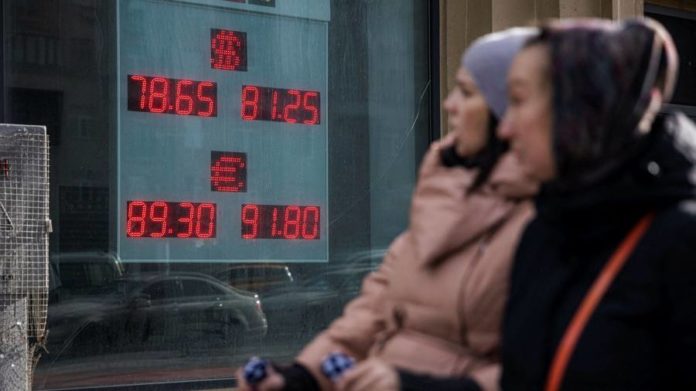Oil prices rose to more than $103 per barrel, European stock markets opened sharply lower and shares in Moscow fell more than a third after Russia’s President Vladimir Putin launched a military invasion of Ukraine.
The regional Stoxx Europe 600 share index dropped 3.1 per cent in opening trades, taking it through a technical correction, defined as a 10 per cent decline from a recent peak. Germany’s Xetra Dax dropped 4 per cent, with similar falls across most European bourses.
Brent crude rose as much as 7.2 per cent, the first time the international benchmark has crossed the $100 threshold since 2014.
Meanwhile, traders piled into government bonds to shelter from volatility in riskier asset classes and the spot gold price hit a 13-month high of almost $1,949 per troy ounce.
The escalation of the conflict in Ukraine is dominating the global market narrative because of the potential for sanctions to cut Russia’s energy and resources out of global supply chains, causing price shocks.
“A situation which seriously chokes off energy supplies from Russia will affect the world as a negative supply shock,” said Sunil Krishnan, head of multi-asset funds at Aviva Investors.
“Some of that [effect] will be through inflation and some [will be] through a chilling impact on growth. We need to watch the euro area most closely in that regard but it will also affect the US.”
“If this situation continues to deteriorate I wouldn’t be surprised to see Brent at $120 a barrel, and that is really the point you’d expect to see co-ordinated intervention [by global suppliers],” said Robert Rennie, global head of market strategy at Westpac.
As explosions were reported near Kyiv early on Thursday morning, the Moscow Exchange suspended all trading. When trading resumed hours later, the benchmark Moex index dived more than 34 per cent. The index is down almost 47 per cent this year.
Futures markets indicated that the US’s S&P 500 was set to lose 2.2 per cent after closing Wednesday’s session sharply lower, while the tech-focused Nasdaq was projected to fall 2.8 cent, putting the index on track to drop more than 20 per cent from its most recent peak and into a bear market.
In Asia, Hong Kong’s benchmark Hang Seng index fell more than 3 per cent, while China’s CSI 300 shed 2 per cent and Japan’s Topix closed 1.3 per cent lower on Thursday.
The yield on 10-year US Treasuries fell 0.07 percentage points to 1.9 per cent as the benchmark government debt instrument rose in price.
In currency markets, Moscow’s offensive sparked a sell-off for the Russian rouble, which sank 10.2 per cent to a record low of Rbs89.99 against the dollar, according to Bloomberg data. The euro also fell 0.5 per cent against the dollar to $1.125.
The market moves came after Putin ordered a military operation in Ukraine’s Donbas region that has been condemned by the US and many other European and western governments.
“All responsibility for the possible bloodshed will be fully and completely on the conscience of the ruling regime,” the Russian president said in an address broadcast on state television.
Additional reporting by Leo Lewis in Tokyo
Unhedged — Markets, finance and strong opinion
Robert Armstrong dissects the most important market trends and discusses how Wall Street’s best minds respond to them. Sign up here to get the newsletter sent straight to your inbox every weekday
Credit: Source link















